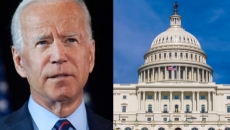A new survey suggests one in four Canadians are extremely concerned about having enough income to cover their basic needs, with the highest degree of hardship being felt by single parents.
The Salvation Army released the data today as part of their annual report examining Canadians' attitudes and experiences with poverty and related socioeconomic issues.
Among single parents, closer to half are reporting extreme concern about meeting basic needs at 40 per cent, while the numbers clock in at 31 per cent for single-person households and 31 per cent for caregivers.
The research by Edelman Data and Intelligence suggests one in five Canadians are eating less so their children or other family members could eat, and one in five also skipped or reduced the size of at least one meal in the last year because they couldn't afford groceries. Those numbers jump again to nearly half for single parents.
The research was conducted Oct. 12 to 19 among a nationally representative sample of 1,515 Canadians, but did not include those living in Yukon, Northwest Territories and Nunavut.
Lt.-Col. John Murray says the findings are troubling but accurately line up with The Salvation Army's internal data and the need at shelters, food banks and churches in the communities they serve.
"They're people that you and I and everyday Canadians know. I think at one point in time perhaps, people who were struggling were the people in other communities, in other parts of the country," said Murray, technical communications secretary for The Salvation Army.
"But what we're seeing is that this is a consistent trend from coast to coast to coast."
Housing security continued to be of major concern for Canadians, with 1 in 10 reporting extreme concern about basic human needs like food and shelter, or being affected by an emergency or natural disaster.
Frequency of food bank usage has also increased, with 22 per cent of those who used food banks in the last year reporting going once a week or more often, up from 18 per cent in 2022. Among those who used a food bank in 2023, nearly half were first-time users.
"One of the things we discovered this year that continues to not surprise us, but I think more disturbs us as an organization, is that children make up 34 per cent of all the people that come to organizations such as The Salvation Army for assistance," said Murray.
The report suggests the proportion of Canadians facing challenges to food and housing security, as well as health issues and managing limited resources, is not expected to improve significantly in the next six months.
And while there are high numbers of Canadians struggling, donation levels to support those in need are actually slightly decreasing by between 0.2 and 1 percentage point compared to 2022.
"It's a reminder to Canadians, for those who do have the capability and capacity to pause, to stop and think of others, to make a donation, to invest in the lives of friends and perhaps family in the communities where they live," said Murray.






